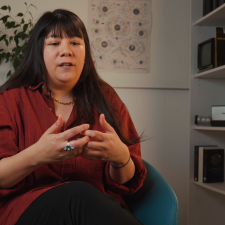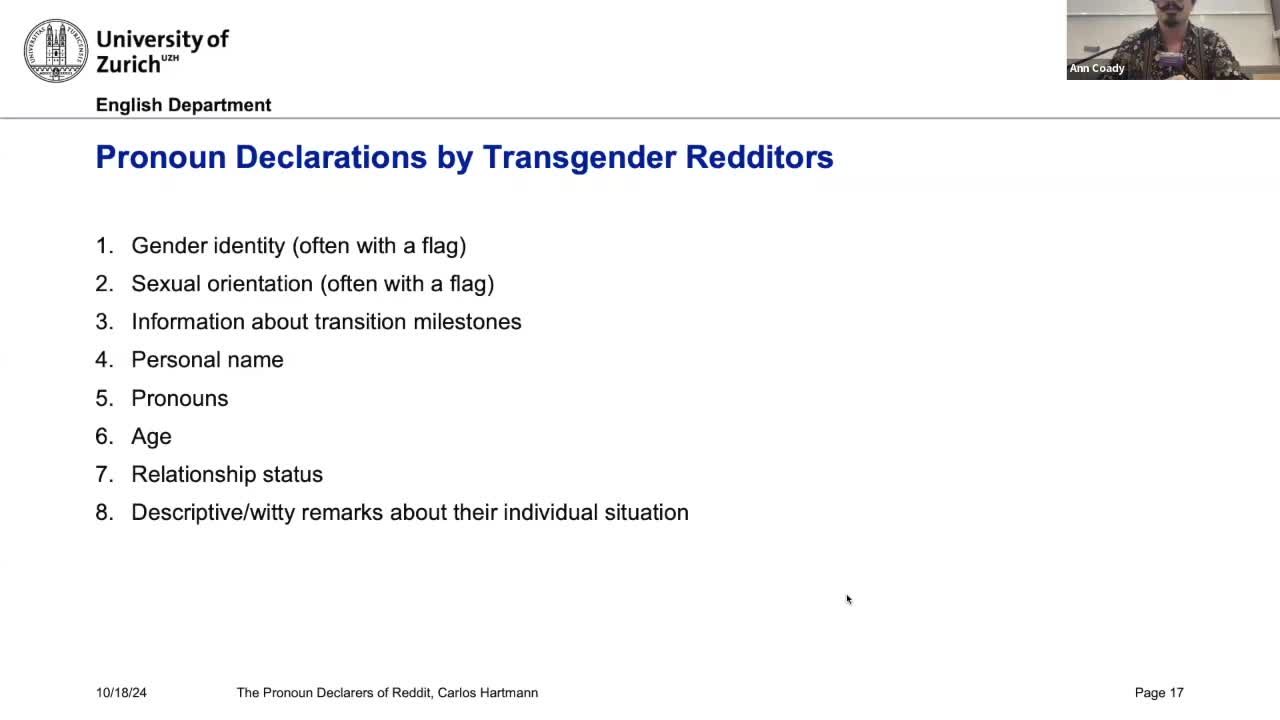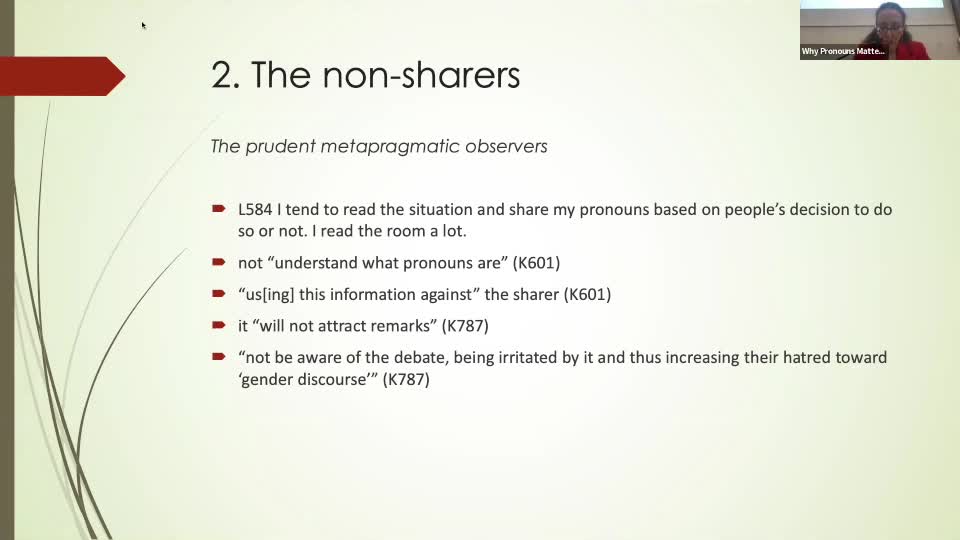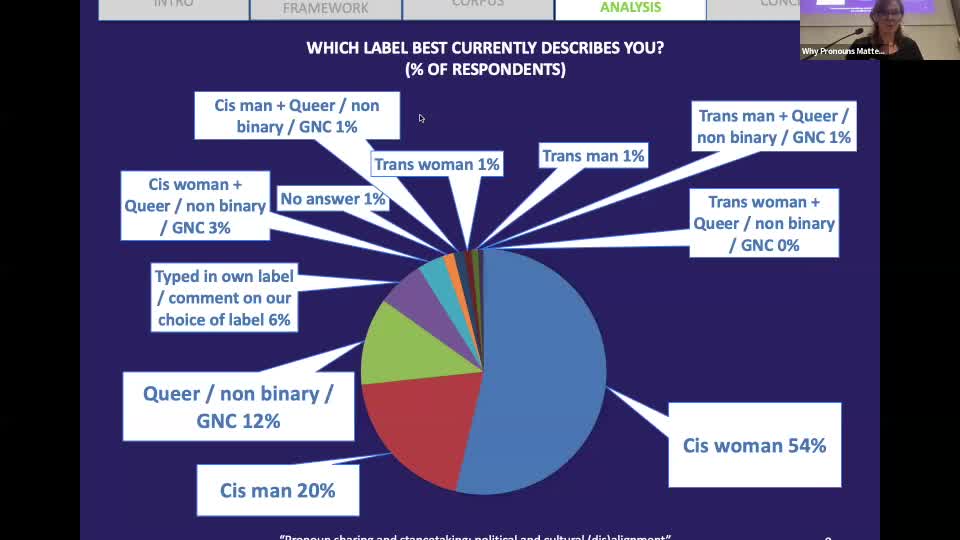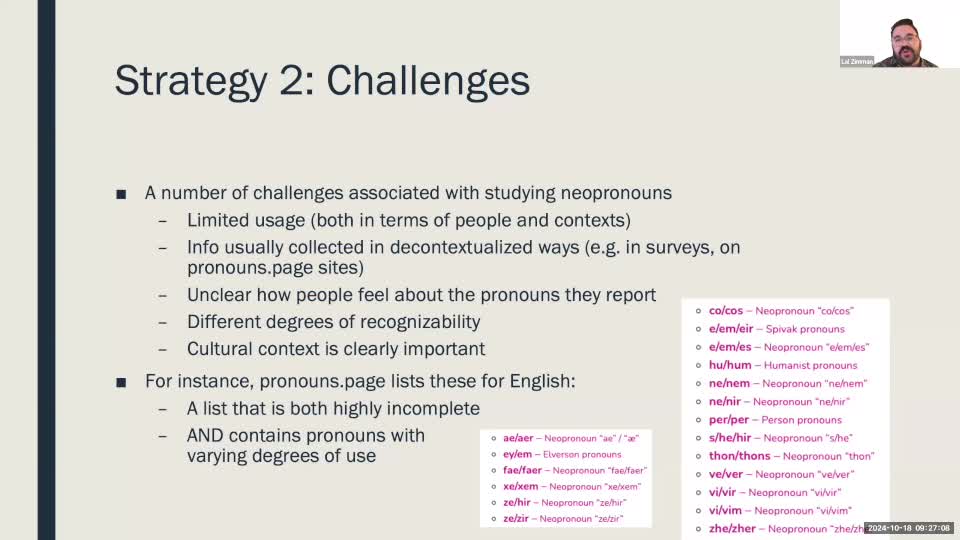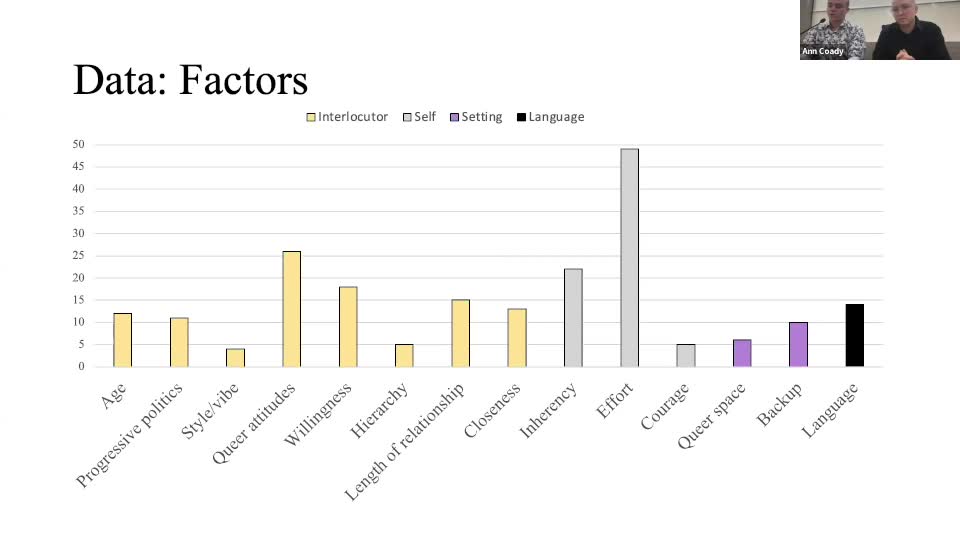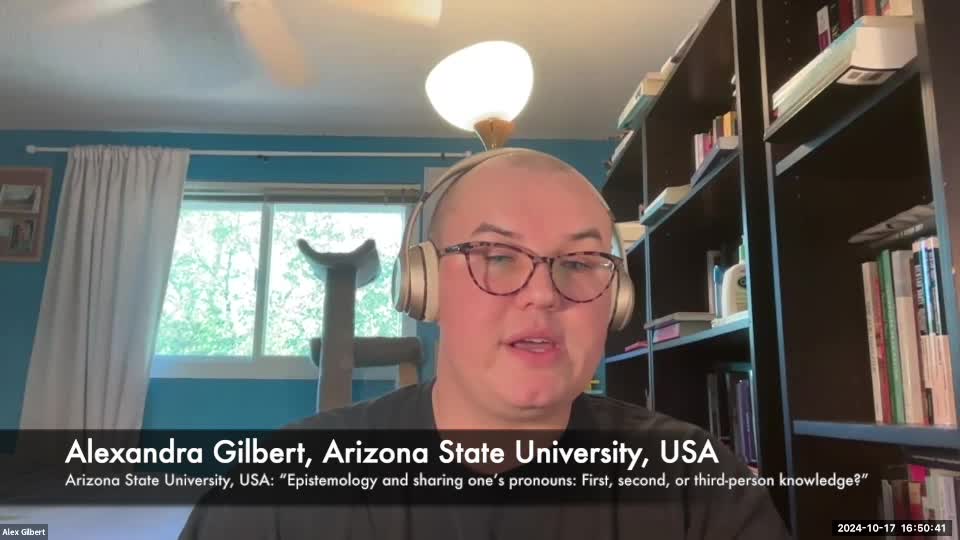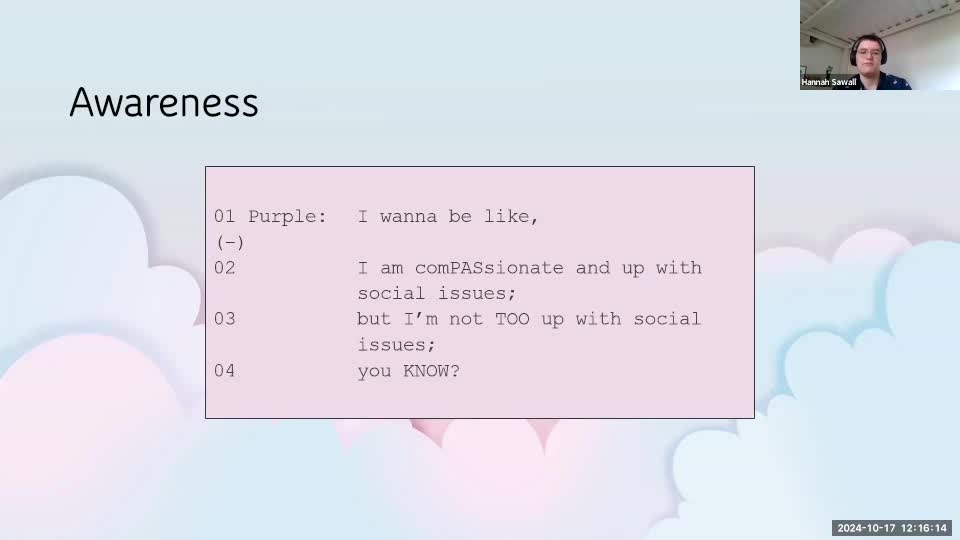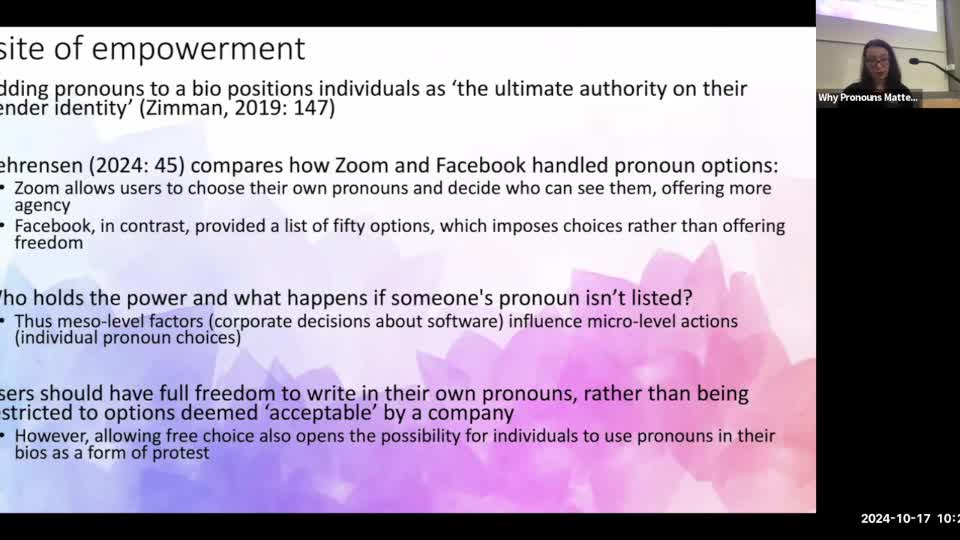Chapitres
- Introduction : Biographie de Benjamin Christensen01'08"
- Elara Bertho présente le film Häxan : entre fiction et réalité, histoire et présent politique du réalisateur concernant les femmes03'25"
- Häxan : dénonciation sourcée et politique de filmer les établissements psychiatriques pour femmes03'55"
- Häxan : un discours engagé mais une esthétique camenant à une ambivalence de la réception00'45"
- Actualités d'Häxan dans le féminisme contemporain : figures attaquées par le male gaze de la femme (âges, canons esthétiques)02'49"
- Häxan / Silvia Federici : Femmes - Outils de l'émergence du capitalisme (valeur publique du corps de la femme / réappropriation des savoirs des femmes)03'14"
- Häxan : utilisation des les effets spéciaux contemporains de l'oeuvre et genre cinématographique entre premier docufiction et film d'horreur02'24"
- Häxan dans l'histoire cinéma : film historique et technique (Elara Bertho et extrait d'un texte d'Adrien Genoudet)03'05"
- Benjamin Christensen : filmographie des mécanismes d'oppression, la justice, les accusations et l'humain face à l'institution01'23"
- Häxan : l'histoire de ses différents montages, orchestrations et usages faces aux relégéitimisations des institutions02'21"
- Häxan et les figures des "Sorcières" - Subversivité : rapport à l'enfermement, à l'alinén.ée, aux pauvres, aux personnes marginales, aux femmes01'38"
- Remerciements00'58"
Notice
Université Paris 8
Hors-série - Festival Sorcière(s) / Häxan, entretien avec Elara Bertho - Un film inclassable, fascinant qui fête son centenaire en 2022
- document 1 document 2 document 3
- niveau 1 niveau 2 niveau 3
Descriptif
A l’origine du festival Sorcière(s) qui s’est tenu les 20 avril et 19 mai 2022 à l’université Paris 8, il y a la volonté de montrer un film, Häxan, la sorcellerie à travers les âges, de Benjamin Christensen, qui fête ses cent ans cette année.
Cette œuvre inclassable, ovni cinématographique, est le premier à dresser un parallèle clair entre l'histoire de la chasse aux sorcières et l'enfermement et la stigmatisation des femmes atteintes de maladies mentales.
Inspiration des surréalistes, film précurseur du cinéma d'horreur, film engagé, œuvre ambiguë, nous avons voulu explorer les singularités de ce film avec Elara Bertho, chargée de recherche au CNRS, et qui travaille notamment sur les liens entre histoire et mémoire. Elle est l'autrice d'un article intitulé De qui suis-je la sorcière ? à propos de ce film.
Nous remercions Elara Bertho d’être venue nous rendre visite à l’université Paris 8 pour enregistrer cette émission à Studio 8. Le DVD du film, dans sa très belle réédition par Potemkine films, est consultable sur place et empruntable à la bibliothèque de Paris 8.
Merci à Raphael Fortoso d’avoir lu l’extrait de l’article d’Adrien Genoudet.
Ce podcast a été réalisé par la bibliothèque universitaire et le service communication dans le cadre du cycle de création radiophonique du festival Sorcière(s).
Thème
Documentation
Focus sur Elara Bertho
↣ ✨ Elara Bertho : ses articles de recherche (colonialisme, genre, représentations)
Focus sur le film Häxan etson réalisateur Benjamin Christensen
↣ ✨Benjamin Christensen
↳ Biographie en français / Biographie en anglais (plus fournie)
↣ ✨ Vidéo présentant Häxan
↣ ✨Articles très documentés sur Häxan
↳ Article sur le site du Collectif Chaudron écrit par Clémence Delhaye
↳ Article sur le site de la Kinopithèque, écrit par Benjamin Fauré
⭐ Dans les rayons de la BU et en ligne ⭐
- Häxan, la sorcellerie à travers les âges de Benjamin Christensen (chez Potemkine 2021) :
● BU – Saint-Denis | Espace audiovisuel | 791.43(489) CHR
- Benjamin Christensen, Häxan, La Sorcellerie à travers les âges par Constance Grumier (Ed. Association française de recherche sur l’histoire du cinéma AFRHC, 2022) :
● BU – Saint-Denis | En ligne | Accès au texte intégral
- Sorcières, tyrans, héros. Mémoires postcoloniales de résistants africains par Elara Bertho dans la revue Cahiers d'études africaines, Ed. de l'EHESS, 2021) :
● BU – Saint-Denis | En ligne | Accès au texte intégral
Silvia Federici
- Auteure de l'oeuvre citée Caliban et la sorcière : biographie
Sur le même thème
-
O inventamos o erramos: De la violencia sistémica a la fantasía. Ideas mutantes alrededor del cine …
CarriAlbertinaSorianoMichèleMaster Class Albertina Carri, à l'occasion de la 37e édition de Cinélatino, Rencontres de Toulouse, du 25 au 30 mars 2025.
-
Law, Identity, and Redemption: Justice in Karan Johar’s My Name is Khan
LefrançoisFrédéricCommunication présentée le 9 mai 2025 lors du Colloque international de la SARI "Représentation de la justice dans le cinéma indien 9 et 10 mai 2025" (Université Sorbonne Paris Nord, Campus de
-
Entretien avec Ariane Mak autour de son ouvrage En guerre et en grève. Enquêtes dans les cités mini…
MakArianeDe 1939 à 1945, le Royaume-Uni a connu plus de 7 000 grèves, en grande partie dans l’industrie charbonnière.
-
Prendre position dans le trouble / Carnet de passages #2
CourdurièsJérômePitzalisJuliaPeyrautLolaMontécotRobinPayssanAlexiComment s’empare-t-on d’une toute nouvelle thématique ? Comment traiter d’un sujet d’actualité mais surtout polémique ? L’expérience de l’anthropologue Jérôme Courduriès s’est construite au travers
-
“A sociolinguistic case study on the Pronoun Declarers of Reddit”, Carlos Hartmann, Universität Zür…
For this study, I extracted and analyzed Reddit comments featuring pronoun declarations within their user flairs, the optional descriptors displayed alongside usernames. The goal was to identify a
-
“What’s in a pronoun and how does it matter?: From the perspective of pragmatics”, Sandrine Sorlin,…
SorlinSandrineIn this talk, I wish to give a quick overview of the quite recent ‘pronoun sharing’ trend from a linguistic and pragmatic perspective, going through the new collocations and semantic shifts of the
-
“Pronoun sharing and stancetaking: political and cultural (dis)alignment”, Ann Coady, Université Pa…
I begin my presentation by putting current pronoun-sharing practices in political and theoretical context, briefly discussing the current political debate surrounding these practices and comparing
-
"Pronouns, positionality, and power: Institutionalized transphobia, intersectionality and trans-aff…
ZimmanLalThis talk explores the complex role of pronouns in the negotiation of (socio)linguistic justice, leading to the argument that the success of trans-affirming language depends on a broader
-
“Pronouns in Motion: Pronoun variability among Swiss non-binary individuals”, Justyna King and Elij…
Our paper aims to explore pronoun practices and flexibility among Swiss non-binary individuals, by elucidating the factors influencing the pronoun usage of Swiss non-binary people, discerning the
-
“Epistemology and sharing one’s pronouns: First, second, or third-person knowledge?”, Alexandra Gil…
In this paper, I consider sharing one’s pronouns as an act that asserts self-knowledge and positions oneself in relation to an addressee and a shared social landscape: see me this way, interact with
-
““Mein Name ist Lena und meine Pronomen sind she/her”: Exploring Indexicalities of Pronoun Sharing …
Since pronoun sharing has been associated with different political stances from virtue signaling to trans liberation, it is clear that they transport more information than simply how a person asks to
-
“Pronouns in bio: A site of empowerment, validation, struggle, performance, distraction, and corpor…
Pronouns in bio: A site of empowerment, validation, struggle, performance, distraction, and corporate rainbow washing?




